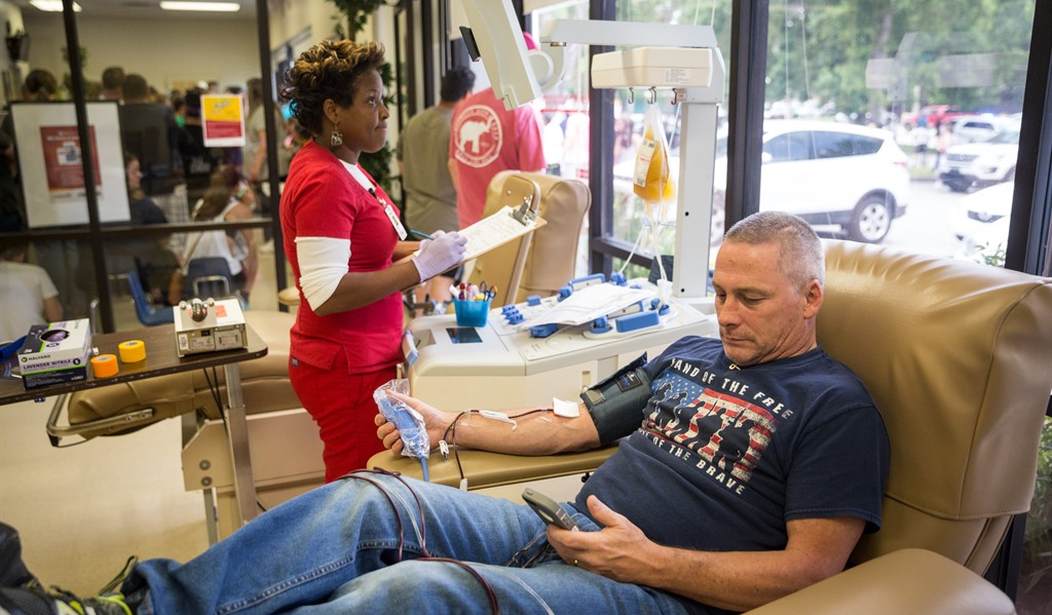If you’re gay or bisexual and have always wanted to donate blood, unprecedented accommodation may soon be yours.
On Friday, the Food and Drug Administration made a major announcement concerning sexual sensibilities and life-saving community contribution.
As you may know, men who have sex with other men are at increased risk for contracting HIV. Hence, in order to give blood, current guidelines require donors to be abstinent for three months before participating. But a new day is dawning.
From The Associated Press:
[According to drafted guidelines], all potential donors would be screened with a new questionnaire that evaluates their individual risks for HIV based on sexual behavior, recent partners and other factors.
If finalized, many gay and bisexual men in monogamous relationships would be able to donate blood for the first time in decades. It’s the latest move by the FDA to broaden donor eligibility, with the potential to boost donations.
Would the altered plan be safe? FDA Dr. Peter Marks remarked to reporters:
“We feel confident that the safety of the blood supply will be maintained.”
The old rules have taken heat:
Gay rights groups have long opposed blanket restrictions on who can give blood, saying they discriminate against the LGBTQ community. Medical societies including the American Medical Association have also said such exclusions are unnecessary given advances in technology to test blood for infectious diseases.
Times past saw a lifetime ban; during the early 1980s — amid America’s AIDS crisis — the government barred blood donations from homosexual and bisexual men. Then in 2015, a one-year abstinence requirement was instated.
In 2020, that period of restraint was reduced to a quarter of a year. Per the AP, the decision was made as a COVID-clobbered world saw donations take a dive.
Currently, screening questions cover a plethora of possibilities:
All potential donors answer questions about their sexual history, injectable drug use and any recent tattoos or piercing, among other factors that can contribute to the spread of blood-borne infections.
All donated blood is tested for infectious diseases such as syphilis, hepatitis C, and HIV.
As for the potentially new protocol, here’s a preview:
[M]en who have sex with men will be asked if they have had new or multiple partners in the last three months. Those who answer affirmatively to either question and also report having anal sex would be barred from donating until a later date. The policy would also apply to women who have sex with gay or bisexual men.
Anyone who’s ever tested positive for HIV will still be ineligible.
From a messaging standpoint, the proposed alteration seems sizable. Surely, apart from technological factors, it reflects the culture’s expanding sexual situation. Since the ’80s, a great deal of things have changed:
Sex Education Book for ‘Good Parents’ Says to Let Your Children Watch
University’s Event Promoting Transgender ‘Littles’ Claims Children ‘Know What Feels Good to Them’
Professor Pooh-Poohs Professed Hetero Preference, Tells Pretenders to ‘Watch Gay and Lesbian Porn’
Ivy League Princeton University Offers ‘Black Plus Queer in Leather’ BDSM Course
Throuples Are so 2021: Welcome to the Five-Member World of a Sexual ‘Polycule’
University Professor Says Sex Work Is the ‘Best Thing’ for Young Adults
As for practical effects of the FDA loosening its requirements, they may be marginal. After all, blood donation is and always has been based on the honor system.
-ALEX
See more content from me:
Professors Insist ‘Sex Is Not Binary,’ Sex Separation in Sports Is White Supremacy
University Removes Slave-Owning Benefactor’s Name, His Family Demands Their $51 Million Back
Find all my RedState work here.
Thank you for reading! Please sound off in the Comments section below.













Join the conversation as a VIP Member